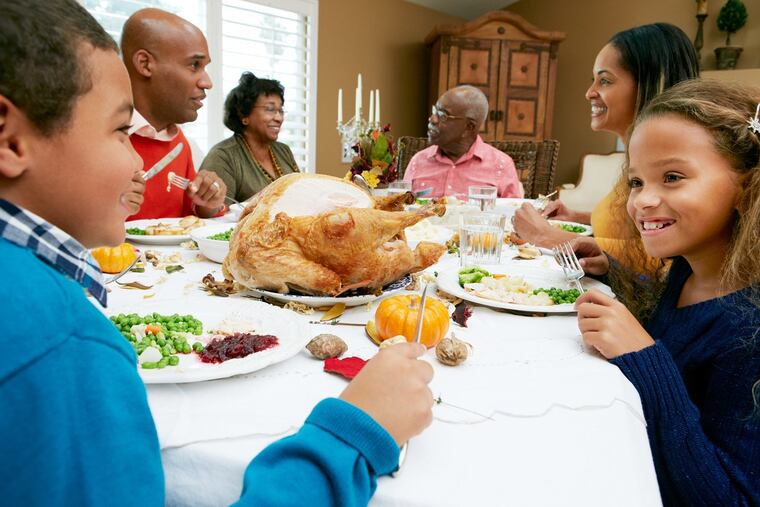Want a conflict-free family Thanksgiving? Try these four tips.
With global violence, polarizing opinions, and a divisive presidential election on the horizon, here's a game plan if you know there will be conflict served up with the mashed potatoes and gravy.

Recently, I was in a hospital waiting room as our family prepared for the birth of our first grandchild. On the screen was a constant stream of images from the Israel-Hamas war, the ongoing conflict in Ukraine, along with protests domestically and abroad. It made me pause to consider: What kind of world we were bringing a child into when all we can see is death and destruction?
Now that we’re coming up on that time of year when thousands of Philadelphians will find ourselves around holiday dinner tables celebrating the season, I’m asking myself another version of that same question: How can we gather for the feast amidst so much suffering?
While the food is clearly the centerpiece of these settings, we’ll do more than just eat. We’ll talk, often with people we haven’t seen for a long time, with whom we may or may not see eye to eye. Many memories are formed around arguments and feuds that have darkened otherwise joyous times with friends and family.
With violence raging throughout the world, polarizing opinions, and a divisive presidential election on the horizon, it might be prudent to form a game plan if you know there will be conflict served up with the mashed potatoes and gravy this year.
As a professor of communication (and a pastor to boot), I am blessed to routinely have conversations with internationally renowned experts in things like intercultural communication and conflict resolution. I also have had the privilege of sharing dialogues with students from every ideological stripe — politically, ethnically, culturally, and philosophically. In all of these exchanges, they’re more than just casual conversations. We talk about what we believe, what gets us fired up, and how something makes us feel. These conversations often represent the essence of who we are.
Many of us have very strong feelings about what’s happening in the world around us. Consider the human tragedies we’re witnessing in Israel and Gaza while seeing antisemitic and anti-Arab attacks here at home. Add the ever-present volatility of politics, racial tensions, and us-vs.-them mentality, and you have the ingredients for volcanic interactions that can blow up any carefully curated gathering.
But we need not enter the season spoiling for a fight. Instead, this can be a time of understanding and bridge-building, if we proceed with the intention of making it so. With that in mind, here’s a simple recipe that can help turn arguments into more productive interactions:
To stir the pot, or not. If you know you’ll be with folks who like turning up your heat, decide if you want to engage, how to engage, and even whether you want to turn the banquet table into a battlefield. These holiday dinners are already fraught with pressures that need not be aggravated by discord. If you’re hosting, set a few ground rules for the table (maybe, no talk of politics). If you’re a guest, set rules for yourself (as in: When my uncle tries to press my buttons, say I need to make a call and walk away). Time we spend with people we care about is too precious to waste in conflict with one another.
Be curious, not confrontational. If you honestly want to learn someone else’s point of view, approach it by asking questions that tease out more. The adage “seeking to understand to be understood” is a good guiding principle to follow. You don’t have to agree with them, but understanding where someone else stands can help refine where you sit with your own position.
Try to relate, not recruit. There’s always common ground, if we’re patient and skilled enough to seek and find it.
Treat all with respect. Let’s be clear on why we’re at the table in the first place. It’s not just to sow seeds of conflict and confrontation, so how productive could it be when we allow dialogue to deteriorate into insults, fistfights, and violence? Never forget the humanity in those with whom we share common space, whether it’s across the table or across imaginary borders that span the globe. Even if you disagree with someone, you should always treat them with respect.
It’s hard to be joyful — such as at Thanksgiving, or the birth of a beloved grandchild — when surrounded by images of death and destruction. Thankfully, the picture we see need not be the future we create. With a healthy dose of hope, we can set a place that feels like a genuine invitation framed by a single word: welcome.
David W. Brown is a pastor and assistant dean of community and communication at the Klein College of Media and Communication at Temple University.